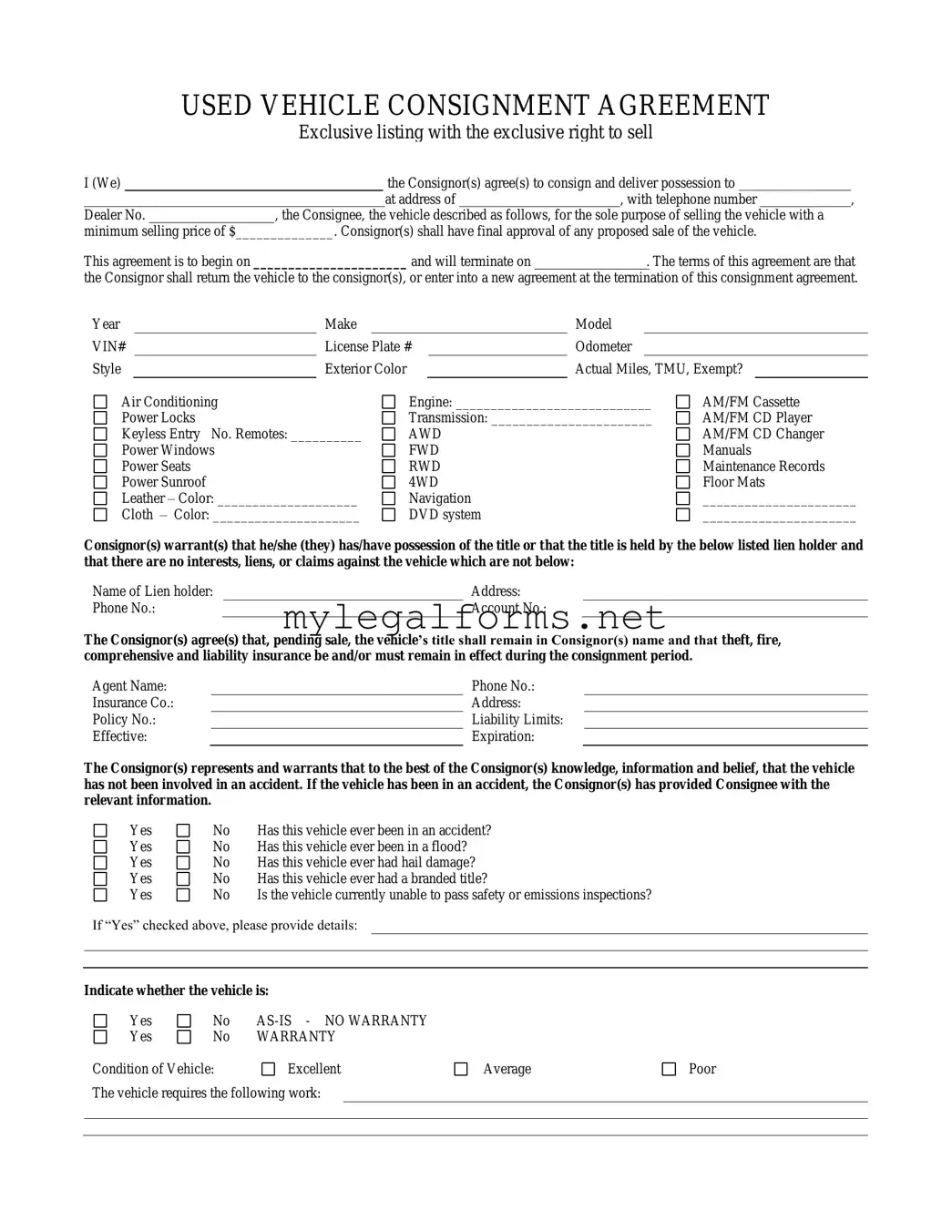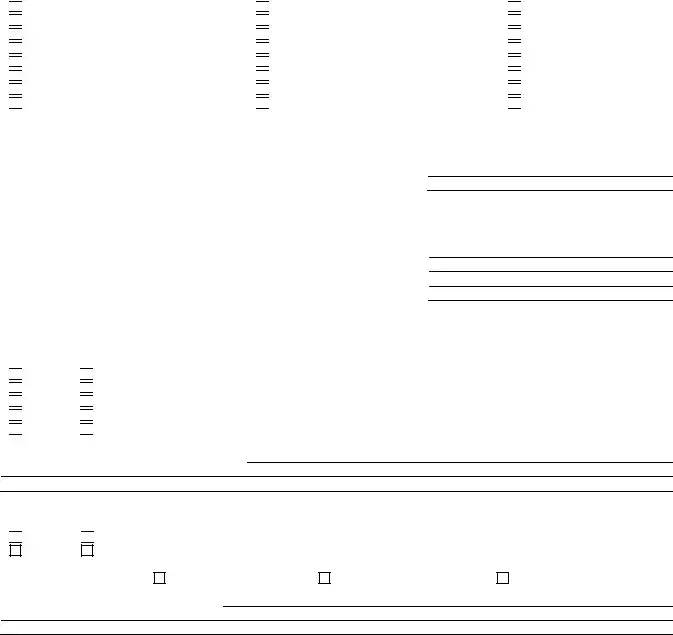USED VEHICLE CONSIGNMENT AGREEMENT
Exclusive listing with the exclusive right to sell
I (We) _____________________________________ the Consignor(s) agree(s) to consign and deliver possession to ________________
___________________________________________at address of _______________________, with telephone number _____________,
Dealer No. __________________, the Consignee, the vehicle described as follows, for the sole purpose of selling the vehicle with a
minimum selling price of $______________. Consignor(s) shall have final approval of any proposed sale of the vehicle.
This agreement is to begin on ______________________ and will terminate on ________________. The terms of this agreement are that
the Consignor shall return the vehicle to the consignor(s), or enter into a new agreement at the termination of this consignment agreement.
|
|
|
|
|
|
|
|
Year |
|
Make |
|
|
Model |
|
VIN# |
|
License Plate # |
|
Odometer |
|
Style |
|
Exterior Color |
|
Actual Miles, TMU, Exempt? |
|
Air Conditioning Power Locks
Keyless Entry No. Remotes: __________
Power Windows Power Seats Power Sunroof
Leather – Color: ____________________
Cloth – Color: _____________________
Engine: ____________________________
Transmission: _______________________
AWD
FWD
RWD 4WD Navigation DVD system
AM/FM Cassette AM/FM CD Player AM/FM CD Changer Manuals Maintenance Records Floor Mats
______________________
______________________
Consignor(s) warrant(s) that he/she (they) has/have possession of the title or that the title is held by the below listed lien holder and that there are no interests, liens, or claims against the vehicle which are not below:
Name of Lien holder: |
|
Address: |
Phone No.: |
|
Account No.: |
The Consignor(s) agree(s) that, pending sale, the vehicle’s title shall remain in Consignor(s) name and that theft, fire, comprehensive and liability insurance be and/or must remain in effect during the consignment period.
Agent Name: |
|
Phone No.: |
Insurance Co.: |
|
Address: |
Policy No.: |
|
Liability Limits: |
Effective: |
|
Expiration: |
The Consignor(s) represents and warrants that to the best of the Consignor(s) knowledge, information and belief, that the vehicle has not been involved in an accident. If the vehicle has been in an accident, the Consignor(s) has provided Consignee with the relevant information.
No |
Has this vehicle ever been in an accident? |
No |
Has this vehicle ever been in a flood? |
No |
Has this vehicle ever had hail damage? |
No |
Has this vehicle ever had a branded title? |
No |
Is the vehicle currently unable to pass safety or emissions inspections? |
If “Yes” checked above, please provide details:
Indicate whether the vehicle is:
□

□
□

□
No |
AS-IS - NO WARRANTY |
No |
WARRANTY |
Condition of Vehicle: |
□ Excellent |
□ Average |
□ Poor |
The vehicle requires the following work:
The delivery of this vehicle is on consignment and is not a sale of the vehicle to the Consignee. The Consignee agrees to receive the vehicle in trust and not to permit its use for any other purposes than what is contained in this agreement without express written consent of the Consignor(s).
Consignor(s) hereby agree(s) to the following commission rates as set forth by the Consignee:
Sale Price of Vehicle |
Commission/Costs |
Sale Price of Vehicle |
Commission/Costs |
$0-$_______ |
$_______ |
$_______-$_______ |
$_______ |
$_______ - $_______ |
$_______ |
$_______ and up |
___% |
Carfax & NADA reports are included in commission cost. Advertising on Autotrader, KBB, CarGurus, TrueCar, Vast, Edmunds &
CarFax Online are included in commission cost. Cars.Com, Craigslist, Ebay and any other specialty ad site are extra on cars under
$_______. Complete detailing, safety inspection, repair work, financing and offered warranty plans are available at an extra cost and are
not included in the commission fee.
Additional Fees If Applicable: |
|
$_______ |
Safety Inspection/Emission |
$___ + Sales Tax (cars/lt trucks) |
Finance Facilitation Fee: |
Labor Rate |
$_____/hour, plus parts |
Professional Detail |
$_______ & Up |
Warranty Plans: |
$_____ & up |
|
|
Upon completion of sale and receipt of a good, negotiable title, the net amount due to the Consignor(s) from the Consignee shall be the gross sale amount less any costs for repairs or detailing previously agreed to by Consignor(s), and commission rate as set forth in this agreement, and further agrees that the Consignee will pay off any existing encumbrances against said vehicle and deduct the same from the net amount due.
If repairs are required before or during the period of consignment, Consignee shall notify the Consignor(s) and shall secure Consignor(s) approval before any work shall commence. All repair costs will be deducted from the Consignor(s) net. If the vehicle is not sold during the specified agreement term, Consignor(s) agree(s) to pay repairs before vehicle is returned to Consignor(s).
In the event the vehicle is sold by someone other than the Consignee during the period of agreement, the Consignor(s) agree(s) to pay the Consignee _____ percent ( ___%) of the price received. In the event a sale is made to a buyer who discussed the vehicle with the
Consignee, then the Consignor(s) agree(s) to pay the Consignee _____ percent ( ___%) of the vehicle’s selling price.
Should the Consignor(s) wish to remove the vehicle from Consignee’s premises, Consignee shall require a minimum of _________ ( __ )
hours’ notice. The vehicle can then be removed between the hours of ______ and ______ pm on weekdays or subject to appointment. All
advertising, detail, repair, inspection, and any other costs incurred while the vehicle was on the Consignor’s premises will be due at the time of removal.
If the vehicle remains unsold and a new agreement is not considered, or if the vehicle has been sold but not removed from Consignee’s premises or if the Consignor(s) or buyer(s) are delinquent in paying fees, Consignee may have the vehicle impounded at the Consignor(s)
or buyer(s) expense without prior notice to the Consignor(s) or buyer(s). Additionally, Consignee may, at any time, demand that the vehicle be removed from Consignee’s premises upon _________ ( __ ) hour notice to Consignor(s).
Consignor(s) hereby promise(s) to defend, indemnify and hold harmless Consignee, its employees agents and assigns from any and all demands, judgments, claims, including reasonable legal and all other expenses actually incurred and paid, incident to any claim whether baseless or well founded by any third party in connection with any automobile taken by Consignee on consignment, including without limitation any claim for taxes by any State of the United States, territory or political subdivision thereof. The indemnification language contained herein shall survive the termination of this agreement,
It is further agreed that the Consignee, its agents or assigns are not responsible for any damage to the vehicle due to fire, accident, theft, vandalism or any cause whatsoever.
Consignor: |
|
|
Email: |
|
Address: |
|
|
Home Phone |
|
|
|
|
Work Phone: |
|
Signature: |
|
|
Date: |
|
Consignee on behalf of ________________________: |
|
|
|
NOTICE TO CONSIGNOR: Failure of the Consignee to comply with the terms of this agreement may be a violation of stature which could result in criminal or administrative sanctions, or both. If you feel the Consignee has not complied with the terms of this agreement, please contact the Department of Motor Vehicles, Division of Investigations and Occupational Licensing Bureau of Investigations, via the local Department of Motor Vehicles office. The Consignee is the person(s) or dealer who is selling the vehicle(s) on behalf of the Consignor. The Consignor is the person(s) who has given the vehicle to the Consignee to be sold.










































































